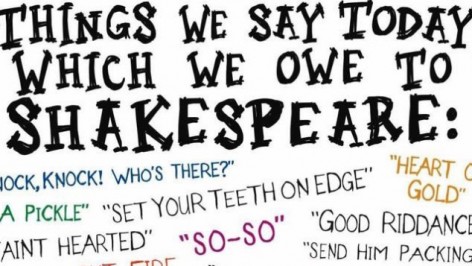 Most of us are familiar or have heard about William Shakespeare’s literary classics such as Romeo and Juliet and Merchant of Venice. But his influence extends beyond literature and poems. Some of the words and phrases that he coined more than 400 years ago continue to be used in our modern language and day-to-day speech. Widely regarded as the greatest writer in the English language, he had a profound and lasting influence on the English language. Credited with introducing nearly 3,000 words into the English language, which made it more colourful and expressive, Shakespeare’s linguistic imprint continues to live on in this day and age. Let’s check out some of the words and phrases we owe to Shakespeare.
Most of us are familiar or have heard about William Shakespeare’s literary classics such as Romeo and Juliet and Merchant of Venice. But his influence extends beyond literature and poems. Some of the words and phrases that he coined more than 400 years ago continue to be used in our modern language and day-to-day speech. Widely regarded as the greatest writer in the English language, he had a profound and lasting influence on the English language. Credited with introducing nearly 3,000 words into the English language, which made it more colourful and expressive, Shakespeare’s linguistic imprint continues to live on in this day and age. Let’s check out some of the words and phrases we owe to Shakespeare.
If you’ve ever gone on ‘a wild goose chase’, or done something to ‘break the ice’, you would have quoted from Romeo and Juliet and The Taming of the Shrew respectively. The words that Shakespeare created not only enriched the English language but also imbued it with vibrant imagery − with phrases such as ‘green-eyed monster’ from Othello to describe jealously. Similarly, words and phrases like ‘leapfrog’ and ‘heart of gold’ from Henry V provide graphic descriptions that added an emotional dimension to language.
Apart from this, Shakespeare also initiated the metaphorical use of words such as “cold-blooded” – a term that could send shivers down your spine just imagining someone who is devoid of emotion, such as a serial killer. Beyond creating new words and phrases, Shakespeare was also a linguistic innovator in his own right. He pioneered the use of grammatical form and structure − including the connecting of existing words to make new words, like bloodstained. These words and phrases have become so ingrained into our modern vocabulary that they almost regarded as clichés.
Here are some words and phrases borrowed from the Bard.
- Bated breath (The Merchant of Venice)
- Be-all and the end-all (Macbeth)
- Elbow room (King John)
- Faint hearted (Henry VI)
- Foregone conclusion (Othello)
- For goodness’ sake (Henry VIII)
- Full circle (King Lear)
- It was Greek to me (Julius Caesar)
- Fashionable (Troilus and Cressida)
- Eyeball (The Tempest)
- Swagger (The Tempest)
- Belongings (Measure for Measure)
Shakespeare’s enduring impact is not only demonstrated in the way we express ourselves, but how we experience and process the world around us. For if the mark of a great writer is that their works are still read, then perhaps the mark of a literary genius is that they’re still spoken, too.


Comments are closed.